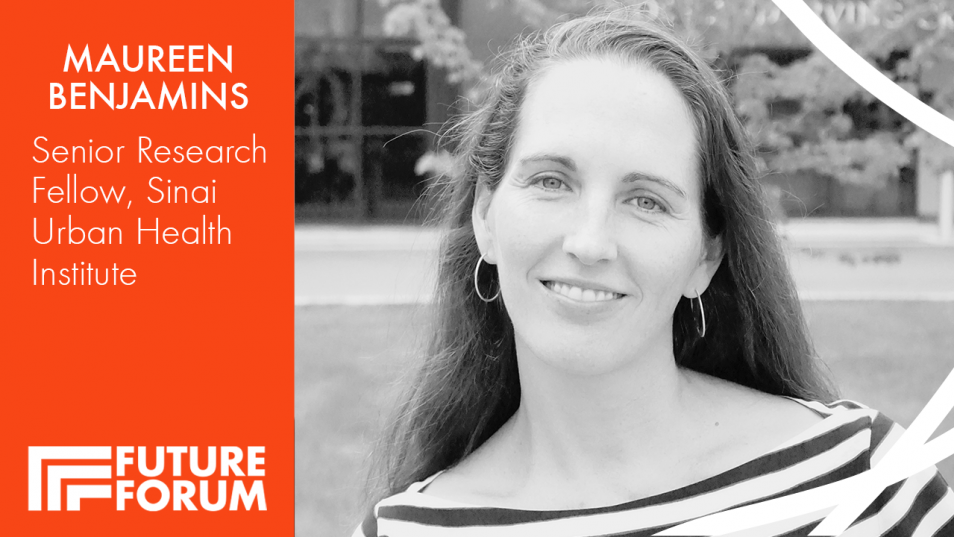A Matter of Life and Death: Fighting Inequities in Health

One of the pandemic’s most scathing reveals, was, arguably, the inequities in health across the globe. From accessing Covid-19 tests early on in 2020, to hospital triages and receiving a vaccine, the spectrum of health care access on a global scale was vast, and the coverage partial.
We sat down with FUTURE FORUM speaker Maureen Benjamins, Senior Research Fellow at Sinai Urban Health Institute, to learn more about her work, including her recently published book Unequal Cities: Structural Racism and the Death Gap in America’s Largest Cities, out now via Johns Hopkins University Press, and her upcoming talk at Before After, an innovation spotlight into matters of life and death: fighting inequities in health.
DWIH New York: Hi Maureen, thanks so much for taking time out of your busy schedule to speak with us. In light of your recent book publication, and looking forward to your innovation spotlight at this year’s FUTURE FORUM: Before After, we wanted to ask you just a couple of questions to gain deeper insight into the work you do. Given the last 18 months’
Back in July 2020, the United Nations Secretary General António Guterres spoke to the General Assembly in commemoration of Nelson Mandela Day. In his remarks, he commented “the pandemic endangers everyone, everywhere, especially the most vulnerable. COVID-19 has been likened to an X-ray, revealing fractures in the fragile skeleton of our societies, and it has laid bare risks we have ignored for decades: inadequate health care; gaps in social protection; structural inequalities; environmental degradation; and the climate crisis.”
In your opinion, and based on your expertise, what did the Covid-19 pandemic reveal about inequality?
Maureen Benjamins: The Covid pandemic has both highlighted – and amplified – existing health inequities in the US (and around the world). In the US, there are striking differences in life expectancy between the Black and white populations, for example. These differences have existed for as long as we have kept race-specific death records. We know they are due to structural racism – that is, the historic and current systems, laws, institutions, and norms that disadvantage people of color and advantage the white population. Unfortunately, pandemics (and other disasters, like hurricanes) tend to disproportionately harm the people who already have the poorest health outcomes. So the rates of infections, hospitalizations, and deaths due to Covid are disproportionately harming communities of color, where individuals are more likely to rely on public transportation, live in more dense housing, work in the service industry, not have paid sick leave, or have trouble getting vaccines and testing due to work hours, healthcare access, and childcare issues. The fundamental causes of racial health inequities – like racism – stay the same across time and across catastrophes, even as the exact pathways to poor health change. All of this leads to the unfortunate fact that Covid is strongly exacerbating health inequities in the US.
DWIH NY: What do you think is needed now to allow more just health outcomes?
MB: There is no easy solution to health inequities. Given that they are fundamentally rooted in structural factors, such as policies related to property taxes, zoning, and economics, all of these disciplines must be included in potential solutions. Trying to improve individual health behaviors and health-related knowledge is definitely not going to move the needle at the population level. In the same vein, improving access to, and quality of, healthcare is also not going to be enough. The solution is a cross-sector commitment to equity in housing, education, labor, and all other aspects of our society.
DWIH NY: So the issues we are tackling aren’t singular or mutually exclusive. It’s truly complex, multifaceted, and an interdependent web of systemic and structural injustices. We will be sure to check out your new book, and look forward to listening to your talk next week at the FUTURE FORUM. Thanks so much for your time, Maureen, and see you in Chicago!
Maureen Benjamins, PhD, is a social epidemiologist and senior research fellow at the Sinai Urban Health Institute (SUHI) in Chicago, IL. She has led several initiatives to study health inequities nationally and in Chicago, including the Sinai Community Health Survey 2.0 and the Unequal Cities initiative. Dr. Benjamins has co-edited two books – Unequal Cities: Structural Racism and the Death Gap in America’s Largest Cities (Johns Hopkins University Press, 2021) and Urban Health: Combating Disparities with Local Data (Oxford University Press, 2011).
FUTURE FORUM: Before After

To play the video, click the thumbnail. Once activated data will be transmitted to the respective provider. Watch on YouTube
